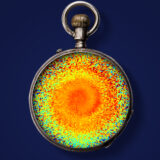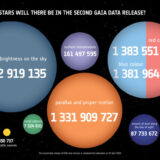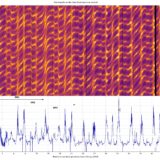Gaia detects a shake in the Milky Way
Image: The spiral shape of fig 1c of our article appears inside an old watch symbolising the fact that these data has allowed us to date back the perturbation that shook the Milky Way disk. This figure shows how from the new obtained Gaia data we can know more about the past of the Galaxy. Credit: Edmon de Haro/iStock. Researchers of the UB and the University of Groningen lead one of the first big discoveries from the Gaia Mission, published in Nature A team led by researchers from the Institute of Cosmos Sciences of the University of Barcelona (ICCUB, UB-IEEC) and the...
read moreOpening of the Gaia Archive
A media briefing is being organised by ESA at the ILA Berlin Air and Space Show in Germany, on Wednesday 25 April 2018. You can find all the information about the event organized around the opening of the Gaia Archive in the link below, as well as the streaming info. The opening will take place at 12:00h. http://www.esa.int/Our_Activities/Space_Science/Gaia/Call_for_media_Second_data_release_from_ESA_s_Gaia_mission
read moreGaia tops one trillion observations
On 14 April 2018, about 10 days before the second Gaia Data Release, the spacecraft and daily data processing systems have reached yet another stunning milestone: the number of star transits has reached 100 billion! The Gaia satellite has two telescopes pointing to two regions of the sky separated by 106.5 degrees. The satellite spins at a rate of 6 hours per revolution with the two telescopes scanning a great circle and the stars continuously transiting the focal plane. Every day, Gaia instruments record about 70 million transits. A full transit includes an observation in the sky mapper (to...
read moreGaia DR2 bulk catalogue available in FAPEC format
The Gaia group at the Universitat de Barcelona (IEEC – ICCUB), in cooperation with DAPCOM Data Services S.L. (a technological spin-off company of the UPC and the UB), has published an alternative copy of the bulk data files from Gaia DR2 – the second data release from Gaia. Gaia DR2 was published on 25 April 2018. Besides the on-line catalogue, bulk CSV files were also made available for download – an interesting option for exhaustive analyses. Such files are officially offered in “csv.gz” format, that is, compressed with the widely known gzip compressor. On 6...
read moreGaia Archive has reached its first 10.000 users in less than 24 hours
This level of traffic is unprecedented for any ESA Science Archive. During these hours we have received 15.751 ADQL queries and 20TB have been downloaded from the file repository. Have a look to the archive: http://gea.esac.esa.int/archive/
read morePresentation of the first data release from Gaia mission
14th September 2016 Aula Magna Enric Cassasas Faculty of Physics Programme outline: 11:45 Presentation (C. Figueras) 11:50 The two first years of the Gaia mission (M. Romero) 12:00 Barcelona’s participation in Gaia (J. Portell) 12:10 The first data release from Gaia (JM Carrasco) 12:25 (approx.) Connexion to ESAC event webstreaming to the official archive opening. 12:35 (approx.) Questions and Answers 12:50 End [UPDATED – Event...
read more








